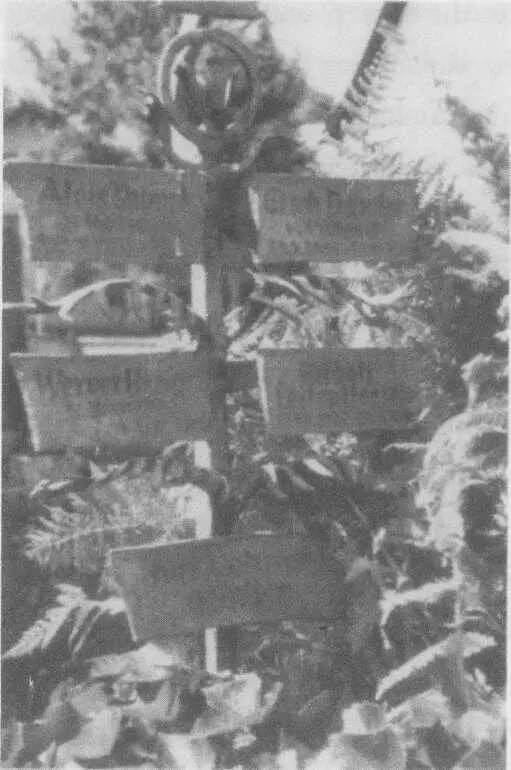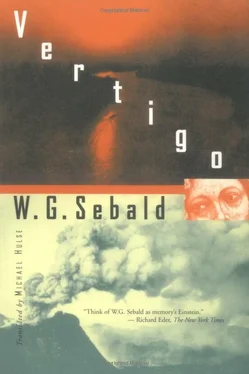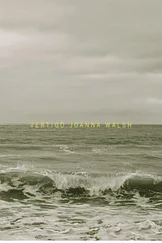Winfried Sebald - Vertigo
Здесь есть возможность читать онлайн «Winfried Sebald - Vertigo» весь текст электронной книги совершенно бесплатно (целиком полную версию без сокращений). В некоторых случаях можно слушать аудио, скачать через торрент в формате fb2 и присутствует краткое содержание. Год выпуска: 2001, ISBN: 2001, Издательство: New Directions, Жанр: Современная проза, на английском языке. Описание произведения, (предисловие) а так же отзывы посетителей доступны на портале библиотеки ЛибКат.
- Название:Vertigo
- Автор:
- Издательство:New Directions
- Жанр:
- Год:2001
- ISBN:978-0811214858
- Рейтинг книги:4 / 5. Голосов: 1
-
Избранное:Добавить в избранное
- Отзывы:
-
Ваша оценка:
- 80
- 1
- 2
- 3
- 4
- 5
Vertigo: краткое содержание, описание и аннотация
Предлагаем к чтению аннотацию, описание, краткое содержание или предисловие (зависит от того, что написал сам автор книги «Vertigo»). Если вы не нашли необходимую информацию о книге — напишите в комментариях, мы постараемся отыскать её.
Vertigo
The Emigrants
The Rings of Saturn
The New York Times Book Review
The Emigrants
Vertigo — читать онлайн бесплатно полную книгу (весь текст) целиком
Ниже представлен текст книги, разбитый по страницам. Система сохранения места последней прочитанной страницы, позволяет с удобством читать онлайн бесплатно книгу «Vertigo», без необходимости каждый раз заново искать на чём Вы остановились. Поставьте закладку, и сможете в любой момент перейти на страницу, на которой закончили чтение.
Интервал:
Закладка:
Around noon — the Tyrolean women had long since got out at Reutte, WeiEenbach, Haller, Tannheim and Schattwald — the bus, with me as its last passenger, reached the Oberjoch customs post. Meanwhile, the weather had changed once again. A dark layer of cloud, verging on the black, lay across the entire Tannheim valley, which made a lightless and godforsaken impression. There was not the slightest sign of movement anywhere. Not even a single car could be seen on the stretch of road disappearing far into the remoter depths of the valley. On one side the mountains rose up into the mists; on the other lay wet boggy grassland, and behind it, from out of the Vilsgrund, arose the wedge of the Pfronten forests, consisting solely of blackish-blue spruce. The customs officer on duty, who told me he lived in Maria Rain, promised to drop off my bag at the Engelwirt inn when he finished work, on his way home through W., which left me free, once I had exchanged a few generalities with him about the dreadfulness of this time of year, to set off carrying nothing but my small leather rucksack over my shoulder, through the boggy meadows bordering the no man's land and down through the Alpsteig gorge to Krummenbach, and from there to Unterjoch, past the Pfeiffermühle and through the Enge Piatt to W. The gorge was sunk in a darkness that I would not have thought possible in the middle of the day. Only, to my left, above the brook invisible from the path, there hung a little meagre light. Spruce trees, a good seventy to eighty years old, stood on the slopes. Even on those growing up from the depths of the ravine, the evergreen tops did not appear until far above the level of the path. Time and again, whenever there was a movement in the air above, the drops of water caught in the countless pine needles came raining down. In places where the spruce stood further apart, grew isolated beech trees that had long since shed their leaves, their branches and trunks blackened by the persistent wet. It was quite still in the gorge save for the sound of the water at the bottom, no birdsong, nothing. Increasingly a sense of trepidation oppressed me, and it seemed as if the further down I walked, the colder and gloomier it became. At one of the few more open places, where a vantage-point afforded a view both down onto a waterfall and a deep rockpool and upwards into the sky, without my being able to say which was the more eerie, I saw through the apparently-infinite loftiness of the trees, flurries of snow high up in the leaden greyness, but none of it had yet found its way down into the gorge. After a further half-hour's walk, when the gorge opened out and the meadows of Krummenbach lay before me, I stopped for a long time beneath the last trees, watching from out of the darkness as the whitish-grey snow fell, its silence completely extinguishing what little pallid colour there was in those wet deserted fields. Not far from the margin of the forest stands the Krummenbach chapel, so small that it can surely not have been possible for more than a dozen to attend a service or worship there at the same time. In that walled cell I sat for a while. Outside, snowflakes were drifting past the small window, and presently it seemed to me as if I were in a boat on a voyage, crossing vast waters. The moist smell of lime became sea air; I could feel the spray on my forehead and the boards swaying beneath my feet, and I imagined myself sailing in this ship out of the flooded mountains. But what I remember most about the Krummenbach chapel, apart from this transformation of the stone walls into the hull of a wooden boat, is the Stations of the Cross, painted by some unskilled hand around the mid-eighteenth century, and half already covered and eaten by mould. Even on the somewhat better preserved scenes, little could be made out with any degree of certainty — faces distorted in pain and anger, dislocated limbs, an arm raised to strike. The garments, painted in dark colours, had merged beyond recognition with the background, which was equally unrecognisable. Insofar as anything was still visible at all, it was like looking at some ghostly battle of faces and hands suspended in the gloom of decay. I could not then and cannot now recall whether I was ever in the Krummenbach chapel as a child with my grandfather, who took me with him everywhere. But there were many chapels like that of Krummenbach around W., and much of what I saw and felt in them at the time will have stayed with me — a fear of the acts of cruelty depicted there no less than the wish, in all its impossibility, that the perfect tranquility prevailing within them might sometime be recaptured. When the snow had eased off, I started on my way again, through the Brànte and along the Krummenbach as far as Unterjoch, where I ate bread soup and drank half a litre of Tyrolean wine at the Hirschwirt inn, to warm myself and prepare for the next stretch, which would be twice the distance. Perhaps prompted by the pitiful pictures in the Krummenbach chapel, my mind turned to Tiepolo once again, and the belief I had held for a long time that, when he travelled with his sons Lorenzo and Domenico from Venice across the Brenner in the autumn of 1750, he decided at Ziri that, contrary to the advice he had been given to leave the Tyrol via Seefeld, he instead made his way westward via Telfs, following the salt wagons across the Gaicht Pass, through the Tannheim valley, over the Oberjoch and through the Iller valley into the lowlands. And I beheld Tiepolo, who must have been approaching sixty by that time and already suffered badly from gout, lying in the cold of the winter months at the top of the scaffolding half a metre below the ceiling of the grand stairway in the palace at Würzburg, his face splattered with lime and distemper, applying the colours with a steady hand, despite the pain in his right arm, onto the wet plaster of the immense, miraculous painting he was creating little by little. With imaginings such as these, and thinking about the Krummenbach painter who had, perhaps in the very same winter, toiled just as hard to represent the fourteen small Stations of the Cross as Tiepolo with his magnificent fresco, I walked on, the time being now about three o'clock, through the fields below the Sorgschrofen and the Sorgalpe, till I struck the road shortly before reaching the Pfeiffermühle. From there it was another hour to W. The last of the daylight was fading by the time I got to the Enge Piatt. To my left was the river, to the right the dripping rock faces through which the road had been blasted at the turn of the century. Above, in front and presently behind me there was nothing but the unstirring black pine forests. The last stretch of the journey was as never-ending as I remembered it from the old days. In the Enge Piatt in April 1945, a so-called last skirmish took place, in which, as it says on the iron memorial cross which still stands in the cemetery in W., 24-year-old Alois Thimet of Rosenheim, 41-year-old Erich Daimler of Stuttgart, 17-year-old Rudolf Leitenstorfer (place of birth unknown), and Werner Hempel (year of birth unknown) of Bòrneke, died for their Fatherland. In the course of my childhood in W. I heard people speak of that last skirmish on various occasions,

and imagined the combatants with soot-blackened faces, crouching behind tree trunks with their rifles at the ready or leaping from rock to rock across the deepest chasms, suspended motionless in mid-air, for at least as long as I could hold my breath or keep my eyes shut.
It was dusk by the time I had passed through the Piatt. White mists were rising from the meadows, and below, by the river, now a good distance away, stood the black sawmill, which, together with its timberyard, burned to the ground in the 1950s, a few days after I started school, in a huge fire that lit up the whole of the valley. Darkness now descended on the road. In former times, when it was made up with crushed limestone, it had been easier to walk on, I remembered, and almost the colour of white. Like a luminous ribbon, it had stretched out before one even on a starless night, I recalled, realising at the same time that I could scarcely lift my feet for weariness. Also, it seemed strange that not a single vehicle had overtaken me, or had come from the other direction, on the whole stretch from the Unterjoch. I stood for a long time on the stone bridge a short distance before the first houses of W., listening to the steady murmur of the river and looking into the blackness which now enveloped everything. On a piece of waste land beside the bridge, where willows, deadly nightshade, burdock, mulleins, verbena and mugwort used to grow, there had always been a gypsy camp in the summer months after the war. Whenever we went to the swimming pool, which the council had built in 1936 to promote public health, we would pass the gypsies, and every time as we did so my mother picked me up and carried me in her arms. Across her shoulder I saw the gypsies look up briefly from what they were about, and then lower their eyes again as if in revulsion.
Читать дальшеИнтервал:
Закладка:
Похожие книги на «Vertigo»
Представляем Вашему вниманию похожие книги на «Vertigo» списком для выбора. Мы отобрали схожую по названию и смыслу литературу в надежде предоставить читателям больше вариантов отыскать новые, интересные, ещё непрочитанные произведения.
Обсуждение, отзывы о книге «Vertigo» и просто собственные мнения читателей. Оставьте ваши комментарии, напишите, что Вы думаете о произведении, его смысле или главных героях. Укажите что конкретно понравилось, а что нет, и почему Вы так считаете.












